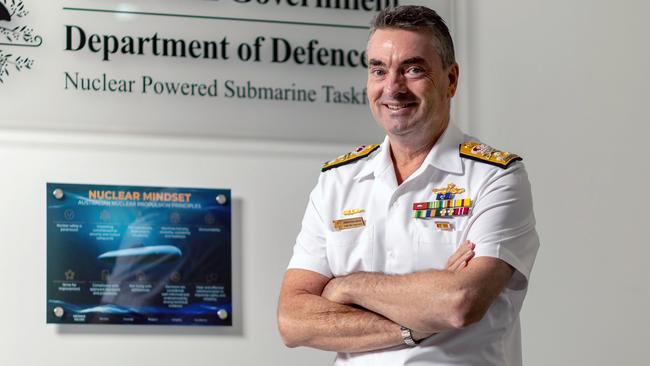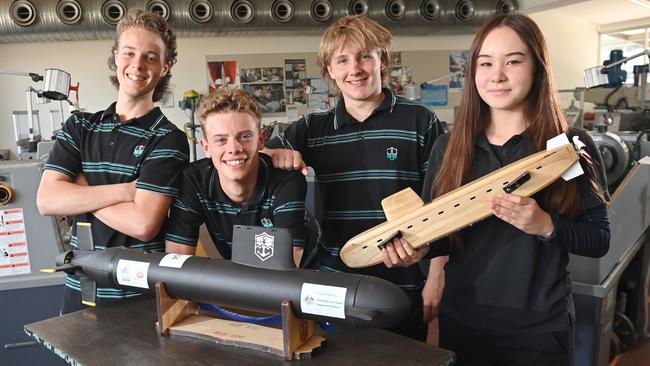AUKUS plans mean a ‘nuclear aware’ Adelaide, naval leader says
There will be “thousands and thousands” of jobs created if SA’s submarine dream comes true. But that presents new problems, leaders say.
SA News
Don't miss out on the headlines from SA News. Followed categories will be added to My News.
All workers in Australia’s future nuclear submarine industry would obtain base-level qualifications in nuclear technology in a “pyramid” workforce system headed up by a group of top experts under official AUKUS plans.
The head of Defence’s Nuclear-powered Submarine Taskforce, Vice-Admiral Jonathan Mead, has revealed new details about how Australia will address the huge challenge of finding enough skilled workers to build, operate and maintain a fleet of nuclear submarines.
Vice-Admiral Mead said all workers would obtain a “core set of skills” through base-level nuclear courses.
“We would see anyone participating in the nuclear-powered submarine program, whether they are building, operating, maintaining or regulating to be nuclear aware,” he told The Advertiser. “Everyone would have a core set of skills and there will be courses done that will (make workers) nuclear aware.”

He said there would be two further levels to the workforce, including a middle layer of nuclear “competent workers” and fully fledged experts at the top.
“There will be people who will be nuclear experts, they will be your PhDs, your people who are deep specialists in nuclear physics, engineering and law,” he said. “So we see this as a bit of a pyramid.”
Vice-Admiral Mead said “thousands and thousands” of jobs would be required, but the main challenge was finding enough people. “Having those people in place will define the success of the program,” he said.
Australian navy officers are currently studying nuclear reactor courses in the US and UK in unprecedented educational programs.
As part of the AUKUS deal, Australia will receive from the US or UK pre-built nuclear reactors to power each boat.
The units will be welded shut and shielded – never to be opened for the more than 30-year lifespan of the submarine.
“I give a commitment to the people of Australia that nuclear safety will be put first beyond everything else,” he said.

Defence Industry trailblazers
South Australian students are excited to trailblaze career paths in the defence and maritime industry – despite it’s uncertain future in South Australia.
Student at Le Fevre High School which offers Maritime High School Programs and STEM courses are looking forward to landing their dream role once they’ve graduated.
Dylan Berggern-Levitt, 16, said he’s excited to use his “skills, knowledge and dedication” to work on submarines in the future.
“Being at maritime school, there’s a lot of opportunities. As someone who’s interested in engineering and maritime career pathways, that’s really good for me,” Mr Berggern-Levitt said.
“I’m studying engineering and I like the metal fabrication side of things. I want to be a project manager and work on big projects (were) I oversee everything.”
Another student, Aiko Morgan, 16, is looking forward to snatching up opportunities within submarines and engineering, diversify the industry and contributing to the “environmental and renewable side of ships.”
Ms Morgan previously participated in a two-year STEM program with Laine O’Rourke.
“The program was all females who told us about their experience of working in STEM and that helped me decide what I wanted to do,” Ms Morgan said.
“As a female, I’d like to collaborate with other people and add to workplace diversity.”
Seth Wallace- Carruthers, 16, is also excited about the upcoming opportunities for the defence industry and will hopefully build a career in “mechanical or navy” engineering.
“It’s a big thing coming up, they’ll be building all the submarines so (this is) a great opportunity find a profession that you enjoy,” Mr Wallace- Carruthers said.
“It’ll bring more people and jobs to the state, especially for people out of high school that want to do engineering in the defence.”
While, William Mackenzie, 16, wants to “serve on the submarines in the technology area including electrician or welding in the navy or submarines.”
“It’s really exciting for me because I’m doing tech at a maritime school, then (I can) apply that knowledge on the submarines,” he said.
“The new technology coming out is really exciting and I’d love to see that in our (defence) industry.”
Assistant Principal of Maritime & Career Development, Liam Narcys is confident students will not be deterred from a career in the defence industry or maritime.
“It may have a slight impact, (but) I know our students are very passionate about the STEM, defence and maritime industry,” Mr Narcys said.
“I’m hoping that something can be arranged for South Australia to ensure we have a bright future for students because they are very passionate and excited.
“If we can get some type of agreement with the State government or Federal government (to ensure something will happen in South Australia with submarines, that’ll keep the students excited.”
Mr Narcy believes the opportunities offered to students at Le Fevre High School will continue to nurture their enthusiasm before they land a job in the industry.
“Working in a high school with specialist maritime and STEM programs, we ensure that students understand their (career) opportunities,” Mr Narcys said.
“Our students get shipyard tours, we have industry and academic partnerships and the local Australian Maritime Fisheries Academy,” he said.





